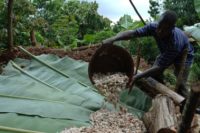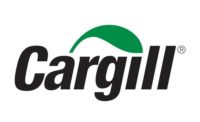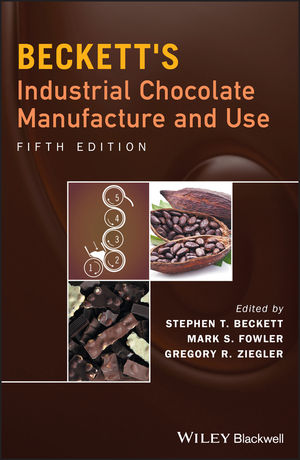With cocoa prices being pressured by speculators as well as industry concerns about consumption and harvests, Cargill Cocoa & Chocolate’s Martijn Bron, trading and sourcing manager, and Piet van Amelrooij, global director of cocoa powder sales, hit the road earlier this year (Jan. 18-29), presenting cocoa market updates and potential crop scenarios to Cargill customers at 15 different sites across the United States and Canada.
The two executives discussed projected crop situations for all the key cocoa bean growing areas, providing an analysis on what to expect in the coming year.
One of the key areas of concern involves aging cocoa trees, which makes them less fruitful and more susceptible to diseases. Aging trees and years of low farmer prices have resulted in a negative trend for the Ivory Coast crop. To improve the current situation, Bron and van Amelrooij stressed the importance of farmers using good agricultural practices and of companies, like Cargill, being directly involved in the assistance of the farming community.
The presentation included an in-depth explanation of current trends in the cocoa market as well as influencing factors for the recently harvested crop. An overview of last year’s predictions and conclusions was discussed, as well as the long-term cocoa bean production outlook and the relative position of cocoa butter versus cocoa powder in the current environment.
Bron and van Amelrooij also provided an update on the partnership between Cargill and the UTZ CERTIFIED cocoa program. A total of 1,590 farmers from two co-operatives in the Ivory Coast received UTZ CERTIFIED cocoa certificates in September 2009, after an intensive eight-month training program. There currently are 17 co-ops training for certification in 2010 and 2011. In November 2009, the first shipment of UTZ CERTIFIED cocoa beans arrived in the Netherlands for processing.
In addition, the presentation showcased Cargill Cocoa & Chocolate’s recently opened plant in Ghana. The plant - which can process 65,000 tons of cocoa beans every year - began operations in November 2008.
Separately, Cargill also announced in February that it will double the number of Farmer Field Schools it operates in Côte d’Ivoire to 300 by mid-2010. The company launched 82 new schools last month, building on the 150 already established. In total, the 300 schools will train 10,000 farmers spread over 35 farmer co-operatives by the end of 2010.
The commitment celebrates 10 years of successful farmer training by Cargill in Côte d’Ivoire and underlines the company’s belief that training farmers successfully is key to building a sustainable supply chain, helps increase farmers’ incomes and supports the future growth of cocoa farming.
“Providing training and support enables farmers to increase yields, improve quality and through these - most importantly - to increase their incomes,” explains Harold Poelma, managing director of Cargill Cocoa & Chocolate. “By raising awareness of environmental, health and social issues, our program is also helping local farming families and communities. In short, the training is directly benefiting farmers today and supports them in becoming successful entrepreneurs for the longer term.”
As a result of the training, farmers are benefitting from a 30% increase in their incomes from higher yields as well as an improvement in the quality of their crop. This quality improvement also leads to an increase in farmers’ earnings as they receive a quality-related bonus payment from Cargill.
During the 10-month Farmer Field School training program, farmers are trained in good and safe practices focusing on farming techniques and post-harvest activities such as pruning, plantation renewal and cocoa fermentation methods. In addition, the program also stresses broader social aspects such as the importance of ensuring children’s education and HIV awareness.








